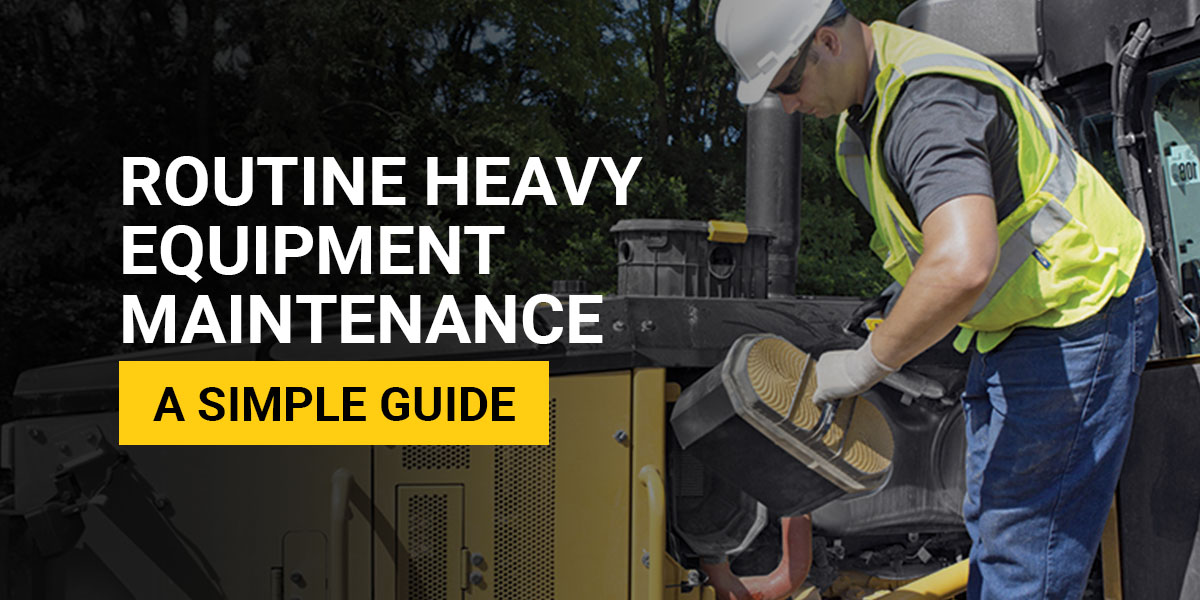
Following a recommended maintenance routine is a preventative maintenance strategy, ensuring your team continuously assesses your machinery’s condition. It’s crucial for a qualified technician to thoroughly test each component, examine fluid levels and run diagnostics to protect your investment and keep your operators safe.
Rather than taking your equipment into the shop every couple of months, a checklist puts the responsibility into your operators’ hands to perform daily walkarounds before and after every use. This proactive approach ensures your team can identify and fix issues before they become severe and expensive.
4 Reasons to Conduct Periodic Heavy Equipment Inspections
Implementing routine heavy equipment inspections into your maintenance strategy is crucial to getting the most out of your fleet’s most important equipment. Operators across various industries, including manufacturing, construction and warehousing sectors, use regular checks to obtain a real-time look at their equipment and ensure they’re ready to go. Many depend on in-cab technology to identify and predict potential problems that may go unseen before they require major repairs.
Regardless of how you inspect your heavy equipment, here are a few reasons to ensure it’s a regular part of your schedule:
- Adhere to legal requirements: Regular inspections ensure your business meets strict compliance and safety standards set by organizations like the Occupational Safety and Health Administration (OSHA). Many restrictions require qualified technicians to conduct periodic checks on specific equipment types to ensure safe performance. Neglecting to follow these requirements could result in hefty fines or legal action.
- Minimize downtime: Failing to inspect equipment is one of the most common reasons job sites experience delays. Equipment breakdowns can drastically impact your operations by creating potential financial losses of up to $1,400 a day and forcing employees to take leave. Either circumstance can significantly slow down your processes and lead to strained client relationships.
- Improve operator safety: Heavy machinery accounts for over 75% of struck-by fatalities and injuries in the construction industry. Performing routine inspections can help decrease the risk of these on-the-job injuries and protect your valued employees. Ensuring your equipment is safe can also keep your staffing costs and workers’ compensation expenses to a minimum.
- Follow manufacturer recommendations: Every machine is different and requires specific maintenance and inspection routines to guarantee it runs efficiently. Equipment manufacturers often give their products detailed inspection schedules that businesses should follow. Adhering to these timelines gives your team peace of mind that your equipment is in top condition.
Types of Inspections You Should Perform
Checklists come in all shapes and sizes, often varying based on the machines in your fleet. Here are a few common steps you should consider adding to your daily routine to keep your equipment running smoothly and efficiently.
Prestart checklist
Before turning on your equipment, conduct checks on the following parts:
- Parking: Ensure your equipment is parked safely and free from hazards and debris.
- Leaks: Look for leaks, puddles or wet spots beneath your equipment.
- Battery: Test your battery’s clamps, cables and connections to ensure it’s charged.
- Oil: Make sure your oil level is sufficient and you’re up to date with your oil changes.
- Tires: Examine your tires for debris and damage and replace nuts and bolts when necessary.
- Parts: Check your machine’s belts, hoses, valves and other components to identify and replace those that are loose or worn down.
- Systems: Inspect your equipment’s engine, cooling and suspension systems, checking for leaks or other damaged parts.
- Cab: Check your mirrors, glass, seatbelts, horn and other cab parts for comfort and proper operation.
- Gauges: Inspect dashboard components like speedometers and check engine lights.
- Seatbelts: Insert the seatbelt into the buckle and tug at it after hearing the click.
Warm up Checklist
After running your equipment for a few minutes, look at the following areas:
- Alarm: Test your alarm system to ensure proper function.
- Horn: Press your horn to guarantee it is loud enough to hear on the work site.
- Air filters: Clean or replace your air filters and listen for strange noises.
- Lights: Turn your headlights, brake lights, signal lights and backup lights on and off to ensure correct operation.
- Hydraulics: Inspect your hydraulic systems and lines while checking for irregular sounds.
- Fluids: Ensure your hydraulic oil, engine coolant, power train and swing drive fluids are full.
- Brakes: Push your brakes, test the parking brake, replace faded brake pads and look for fluid or air leaks to keep operators safe.
Shutdown Checklist
Follow these steps to set yourself up for success tomorrow:
- Fuel tank: Fill your fuel tank until it’s full, and screw the gas cap until secure.
- Engine: Idle your equipment’s engine for at least five minutes before turning it off.
- Clean: Wash your equipment to remove buildup from the day’s work and minimize the risk of damage.
- Parking: Find a secure and clean parking spot away from dangers and debris, like trees.
Contact Carolina Cat to Learn More About Our Preventative Maintenance Plans
It’s your job to take care of your fleet, and it’s our job to provide the assistance you deserve. Our team eliminates the stress of maintaining and repairing your machines with unique, personalized Planned Maintenance plans that fit your needs. Our expert service team leverages over 95 years of experience and industry-leading technologies to deliver dependable solutions at our facilities and on your job site.
Contact our team online to learn more and make routine maintenance easy.